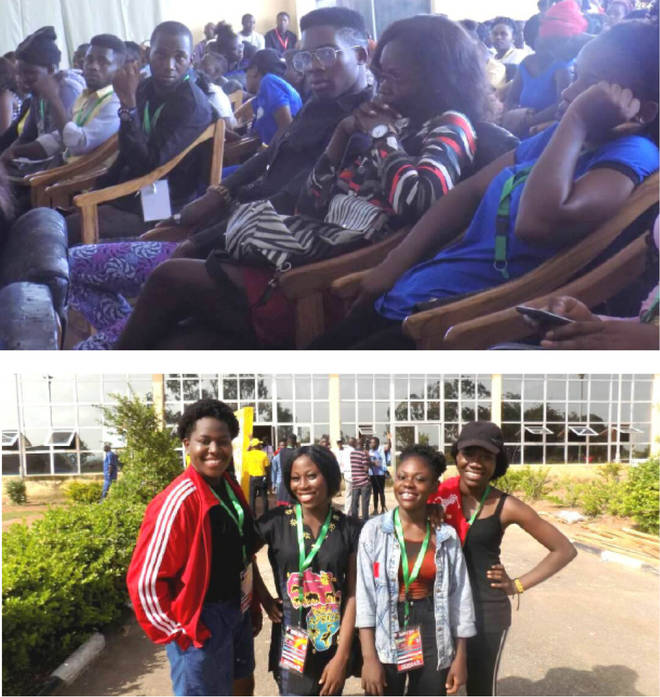
From June 3, buses arrived Jos, Plateau State, with students from different universities across the country. It was the 2018 National Universities Theatre Arts Festival (NUTAF), a five-day annual event hosted this year by the Plateau State University, Bokkos.
This year’s festival is the 38th and had about 24 schools in attendance, such as Ahmadu Bello University, Zaria; Lagos State University; Igbinedion University; Nasarawa State University, Keffi; University of Calabar and so on.
Themed, ‘Nurturing a Vibrant Film and Video Culture for Economic Prosperity’, the festival featured dance classes, filmmaking classes facilitated by award-winning filmmaker Kenneth Gyang, drama, and many more attractions.
One of the high points of the event was a drama presentation by Theatre Arts students of the Ekiti State University. Directed by 18-year-old Enioluwa Adeoluwa, they performed a colonial era play that earned them a resounding applause.
Another was the showing of a film titled ‘Poverty Cure’, a six-part series produced by Action Media. The documentary traced the root of poverty in countries, particularly in Africa and sought to provide remedies in a most intriguing way.
In his speech, the Executive Director of the National Film and Video Census Board (NFVCB), Alhaji Adedayo Thomas, pointed out that theatre and film can be used to discuss economic issues. He outlined the NFVCB’s plans for universities, which include creating NFVCB clubs in schools and women empowerment programmes.
Adedayo urged the students to stop buying and downloading pirated videos because they are cheap. He pointed out that the same could happen to them someday.
“You must stop actors and actresses from dying. Recently Aisha died of cancer, and another top actor is down with a life-threatening sickness and funds are being solicited. If their work is not pirated, they will have enough funds to foot their medical bills,” he stressed.
“As the key regulators of the Nigerian Motion picture industry, the Board has decided to bring practical knowledge of how the sector works to potential film makers so as to secure the future of the movie industry,” he said, adding that the initiative is aimed at teaching students the various classification ratings of film and video works, in order to properly position the upcoming script writers, actors, producers, and directors for opportunities that abound in the industry.
In a workshop tagged ‘Film and Video: The Destination for Economic Prosperity in Africa’, Prof. Victor S. Dugga of the Federal University Lafia explained at length why there is need for the film industry to go with technological trends.
At the festival, there were opportunities for students to be part of anything in their area of interest. Salem Kalu, a student of the Department of Theatre Arts, University of Abuja, for instance, benefitted from the dancing class at the event. A student was more passionate learning about film directing and felt they should have had more time to learn. But the NFVCB boss assured them that opportunities were available for mentoring them to reach their goals even after the festival.
One of the shortcomings of the festival, however, was the obvious poor organisation. The venue of some of the events which took place at the National Drug Law Enforcement Agency (NDLEA) training camp in Lamingo, didn’t look well prepared for the programme. The premises was also where students stayed during the five-day event. But they seemed to have what they needed because food and other needs were available just outside their hostels.
But why is holding NUTAF important at this time when some parts of Nigeria is going through economic and social crises?
The convener, Dr. Edward Ossai, Head of Department (HOD), Theatre Arts, Plateau State University, Bokkos, pointed out that it is a way of intervening through art. “That is why we tagged the year’s theme, ‘Connecting Bridges’. We want to connect bridges and bring Nigeria back to the years when everyone was free to walk around, where ethnicity and religion were not big issues. So, we thought the 38th edition of the festival must be different, and that is why we hosted it in Jos because this is a state that promotes peace and tourism. We ought to promote peace. For a long time now, we have not had as many students attend a festival. In Benin last year, there were about seven universities, but this year we had about 24. This is different,” he said.
What was remarkable about this year’s festival was the fact that more than 600 undergraduates were in attendance.The festival, which is the 38th in the series, also had in attendance professors, heads of departments, and lecturers.

 Join Daily Trust WhatsApp Community For Quick Access To News and Happenings Around You.
Join Daily Trust WhatsApp Community For Quick Access To News and Happenings Around You.


